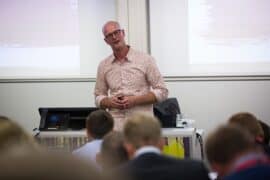The Lavin Agency Speakers Bureau
A speakers bureau that represents the best original thinkers,
writers, and doers for speaking engagements.
A speakers bureau that represents the best original thinkers,
writers, and doers for speaking engagements.
Overcome the forces that resist change, and watch your most innovative ideas take flight.
How can we convince people to embrace new ideas? Loran Nordgren says that it’s all about removing the frictions that keep us from accepting innovation. Loran is the bestselling author of The Human Element and professor at the Kellogg School of Management; he uses his expert knowledge in behavioral science to help business leaders, marketers, and educators understand the four forces that act against change that we face when bring our ideas to market. He’ll teach you how to smooth the path for consumers to accept your new product, taking into account every friction and eliminating them before they become a problem. Adam Grant, New York Times bestselling author of Think Again, says that if you’ve ever been frustrated by people rejecting your idea or refusing to change, Loran’s work is “just what you need.”
“Revolutionary, insightful, and engaging strategies for people who want to successfully launch a project, product, or idea.”— Francesca Gino, Harvard Business School
Whether you’re a business leader, a project manager, an educator, or an activist, at some point, you’ve probably wondered why some of your best ideas keep getting rejected. It turns out there are four psychological forces or “frictions” that keep us rooted to the status quo—inertia, effort, reactance, and emotion—and we rarely consider them when we’re presenting a new idea, instead focusing on what makes the idea itself compelling. Unfortunately, this common practice is like “building an airplane and caring only about engines and not aerodynamics,” says Loran Nordgren. In The Human Element, a WSJ and USA Today bestseller, Nordgren and his co-author David Schonthal steer us away from the conventional path of persuasion to teach us an even more critical skill: overcoming resistance. Described as “an engrossing read on what it takes to open other people’s minds” (Adam Grant), this book shows us how to transform our most basic evolutionary instincts into catalysts for change.
A Professor of Management and Organizations at the Kellogg School of Management, Nordgren’s research explores the forces that propel and prevent the adoption of new ideas and actions. He has helped companies across the globe work through a wide range of challenges through a process he calls Behavioral Design. Whether it’s reducing turnover rates, improving employee habits, increasing word-of-mouth referrals, or creating a culture of innovation, Nordgren draws on his wealth of insights—as both a lecturer and scientist—to guide us towards meaningful change.
Nordgren’s work has been published in leading journals such as Science and has been widely discussed in prominent forums such as The New York Times, The Economist, and the Harvard Business Review. He has received the Theoretical Innovation Award in experimental psychology, as well as numerous teaching awards for excellence in the classroom. A former Fulbright Scholar, Nordgren teaches MBA and executive level courses on the Science of Leadership and Leading Organizational Change, and was once named one of Poets&Quants’ 40 under 40 business school professors. Nordgren has shared his cutting-edge insights with some of the world’s leading organizations, such as Amazon, Google, The Chicago Cubs, and the Aspen Institute.

Harvard Kennedy School Professor Author, How to Disagree Better

Speaker on Stress and Leadership in the Workplace Columbia Business School Professor Host, TED Business Podcast Expert, Limitless with Chris Hemsworth

Professor of Organizational Behavior at London Business School Author of Alive at Work

Harvard Business School Behavioral Science Professor "40 Under 40 MBA Professor" Author of TALK: The Science of Conversation and the Art of Being Ourselves

Bestselling Author of Cultures of Growth Indiana University Professor Founder and CEO, Equity Accelerator
CEO of Trend Hunter New York Times bestselling author of Create the Future

#1 New York Times Bestselling Author of Grit and Situated | Pioneering Researcher on Grit, Perseverance, and the Science of Success

Nobel Prize Winner | 3rd Most Cited Economist in the World | Bestselling Co-Author of Why Nations Fail and Power and Progress

Harvard Business School Behavioral Science Professor | "40 Under 40 MBA Professor" | Author of TALK: The Science of Conversation and the Art of Being Ourselves

#1 New York Times Bestselling Co-Author of Abundance | Host of thePlain English Podcast | CBS News Contributor

#1 New York Times Bestselling Author of How the Word Is Passed and Above Ground | The Atlantic Staff Writer



Leadership, ultimately, is about making good decisions. Yet we rarely step back to analyze the thought process we use to make important decisions. Grounded in science, this interactive presentation by Loran Nordgren identifies the decision traps we all face and offers strategies for how to avoid and overcome them. Participants leave with practical strategies for improving the quality of their decisions.


The biggest line item for most companies is employee compensation. For that reason alone, every leader and organization ought to care a great deal about motivation. Because it is your biggest expense, you need to attract and retain the best people and keep them performing at a high level. This session asks two essential questions: what do people need in their work in order to flourish? And when motivational problems arise, how do you assess and fix them? In this essential presentation, author and professor Loran Nordgren offers leaders the tools to diagnose the health of their motivational environment and give them an edge in the war for talent.